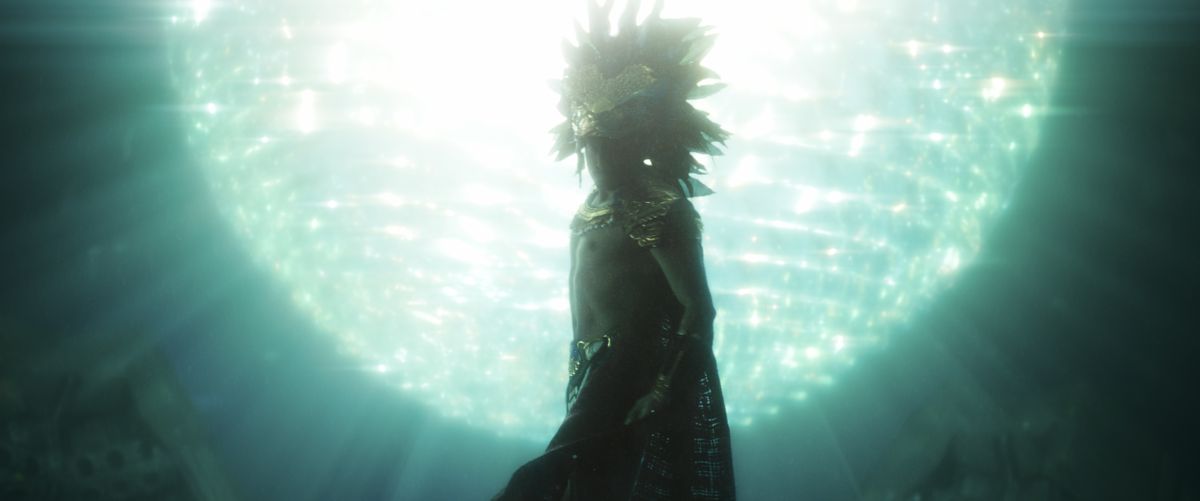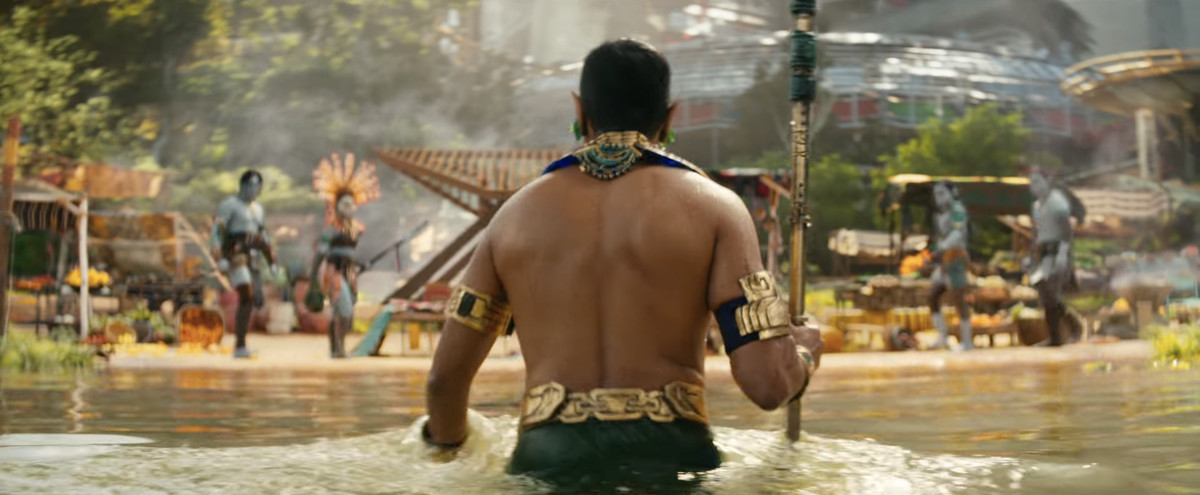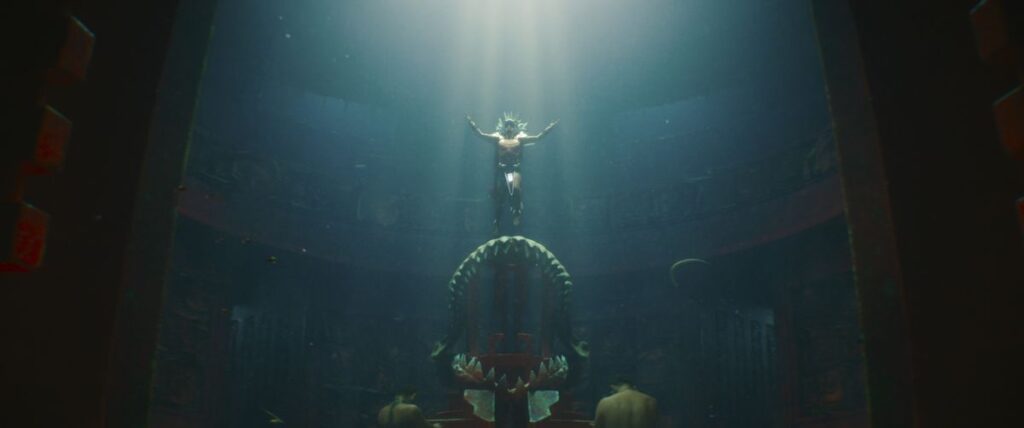They don’t have a word for what Namor is. Black Panther: Wakanda Forever stresses this about its antagonist, a mysterious, superhuman man who emerges from the ocean’s depths to threaten the film’s heroes.
“His people,” Winston Duke’s M’Baku says in one of the film’s most memorable line readings, “do not call him General, or King. They call him K’uk’ulkan: the feathered serpent god.” It’s a level of mystique that Namor lives up to the first time he speaks for himself, sneaking into the hidden land of Wakanda. In less than a minute, Tenoch Huerta’s performance adds to the myth, imbuing his first, brief monologue with wonder, curiosity, history, and menace. He is like nothing we’ve seen before. He is K’uk’ulkan, as his people call him. He is also, as he intones to Queen Ramonda, Namor to his enemies.
This is the first, powerful suggestion that there is an edge to Namor that is both different and familiar, one that, upon close examination, takes the cartoonish rage of the comic book character he’s based upon and roots it in something real. Like the few other good villains in the Marvel Cinematic Universe, he is angry about something that matters, both to other characters in the film and to the real-world cultures he is a stand-in for. And like the best villains in any fiction, he’s simply inevitable, the effect of causes that should not have been forgotten.
Ryan Coogler’s Black Panther films aren’t just works of adaptation, but reinvention. This is by necessity: Much of the comic book source material wasn’t suitable for modern sensibilities, trafficking in stereotypes and dated tropes in dire need of an update. Concurrent with an acclaimed comic book relaunch by Ta-Nehisi Coates and Brian Stelfreeze, Coogler’s film gave the Black Panther and his kingdom a creative and thorough refresh that also highlighted much of what was already there, to make Wakanda a more perfect dream of an African diaspora.
What Wakanda Forever does with Namor and his people is something more radical. In the Marvel comics — where Namor, also known as the Sub-Mariner, was one of the publisher’s first superpowered adventurers — the character’s origins lie in Atlantis, where he is born the son of a human explorer and an Atlantean princess. Inheriting the mythical kingdom’s throne, Namor would quickly come to favor his Atlantean heritage after witnessing the surface world’s negligence toward the ocean, with the superpowers to back up his frequent threats to the land-lovers of Earth.
Comics Namor is also an absolute pill. He’s arrogant, rude, proud, thoroughly convinced of his own superiority and not shy about telling you. This means he’s tremendous fun to have in a story, and why he’s endured for nearly a century. It’s also effectively meaningless: This arrogance isn’t necessarily rooted in anything; it’s merely who he is.
All of this is different in Wakanda Forever. The film’s biggest twist is a small one: the revelation that vibranium, the mystery metal that fuels Wakanda’s technology and economy, exists somewhere else on Earth. This new version of Namor comes from Talokan, an underwater nation founded on and around this other source of vibranium. Partway through the film, Namor explains that Talokan came to be hundreds of years ago, when European colonizers came to the Yucatán peninsula, bringing disease that spread among the Indigenous peoples like wildfire.
Image: Marvel Studios
In desperation, a tribe discovers a plant transformed by vibranium that, when consumed, turns them into superhuman water-breathers, enabling and forcing a retreat to the ocean’s depths. Namor’s mother is among the people transformed, and it alters her pregnancy, making her son a mutant: He gains wings on his feet and distinctive pointy ears along with the newfound powers of his people, all while retaining his natural skin color and the ability to breathe air. His people imbue his birth with divine meaning, a link between their past and future made flesh, and the boy is destined to be king.
This is the subtle difference that changes everything: Namor, unlike the late T’Challa or those he is survived by, represents and leads a nation born from loss, and that loss informs everything he does and believes — and also allows the character to transcend his complicated four-color origins and become the perfect foil for a film about grief. It also gives him a specific, powerful kind of rage that is missing on the comics page, the origins of which Wakanda Forever lays out in brief but searing detail.
Namor, now a boy, returns to the surface with others to bury his mother in the land she was born in, only to find it settled by Spanish colonizers who have enslaved the region’s Indigenous people. In a fury, the boy and his fellow Talokanil lay waste to the colony, killing everyone and cementing his hatred of the surface world. He takes his name from the anguish of the colonizers he kills: In Wakanda Forever, Namor is a portmanteau of the Spanish phrase sín amor, or “without love” — a name for his enemies to fear.

Image: Marvel Studios
In this, Namor becomes a metaphor for the Latin diaspora, a vast mosaic of people and cultures united by the plunder of colonialism and the eradication of Indigenous nations. He is the personification of the native roots nearly snuffed out of the world, a quiet yet potent rage that is one of the few things a disparate and diverse ethnic group has in common. His anger comes from the bones of the Earth and Latin America’s fragmented cultural memory. Not unlike Killmonger before him, he is the radicalized response to the foundational crimes that make present-day prosperity — and injustice — possible.
In the comics, Namor has a catchphrase. It’s classic comic book stuff, something he shouts when he makes a dramatic entrance or delivers a punch so big it breaks the boundaries of a single page. “Imperius Rex!” he bellows, a phrase that translates roughly to “emperor king,” a nonsensical shouting of his own title, like a producer about to drop the beat on a hip-hop track. Read enough comics and you’ll cheer whenever it’s used.
Wakanda Forever is not the sort of film where that utterance makes sense, but it finds a moment at the film’s conclusion, when Namor is bested in battle and collapses before making a choice about how his war will end.

Image: Marvel Studios
He doesn’t say it in Latin, but in the Yucatán Mayan of his people, a language that, director Ryan Coogler notes, doesn’t have those words. Translated literally, the phrase is something slightly different: “eternal king.”
“He was made king before he was even born; it was something that he didn’t have a choice in, it was destiny,” Coogler says. “He’s gonna live a long time. And his duty is to make sure that he sees to it that Talokan prospers to the point that they’re not ever having to worry about anything else again.”
It’s a beautiful dream for a world that doesn’t exist anymore, the perfect flaw for a man who will always be king. It’s the dream of both K’uk’ulkan and Namor, the god of his people and the man without love. It’s exactly what you say when your people have been forgotten by the world, and you are willing to flood every last acre of land to bring their memory rushing back.

